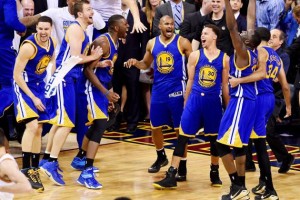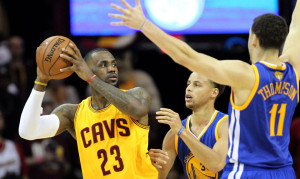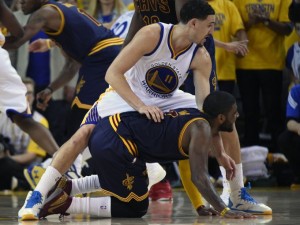
*But his absence helps Cleveland stack up against the Warriors.
When Kevin Love suffered a concussion in the first half of Game 2 of the NBA Finals, opinion was split on his impact to a Cavs team facing a 2-0 deficit against the Golden State Warriors. Some thought Love’s injury and, later, his inability to play in Game 3 would spell doom for Cleveland; others felt his absence would actually help the team. Still others believed that the series was already over regardless of Love’s presence.
Sure enough, the Cavaliers rocked the Warriors by 30 in Game 3, inserting themselves back into the series. They did so without Kevin Love.
So it was no surprise that after the game, many pundits pointed to Love’s absence as a case of addition by subtraction rather than a crippling loss. Here are just some headlines from the postgame reaction:
The Cavaliers Should Trade Kevin Love This Summer, But Where? (SB Nation)
Let’s Face the Facts: The Cavs Are Better Against the Warriors Without Kevin Love (CBS Sports)
It’s Time for Cavs, Kevin Love to Decide If They Fit in or Fit Out Together (Bleacher Report)
It looks like some are already jumping ahead to this summer, one that should see the salary cap rapidly approach $100 million. Whether or not the Cavaliers wish to keep Love may be impacted by the fact that the team is almost $24 million over the league’s $84.7 million luxury tax for this season; Love’s contract calls for a cap hit of over $20 million every year until 2020. While Dan Gilbert has exhibited the willingness to win no matter the cost, financials could play into the Cavs’ ultimate decision on Love.
But there really isn’t time to worry about this now. What we can pay attention to is the Cavaliers’ NBA Finals matchup with the defending champions and single-season wins record holders, the Golden State Warriors.
And the fact is, Cleveland is probably better, at least in this series, without him.
In Game 1, Love shot 7-17 and scored 17 points. However, he only shot 3-10 from inside the paint and 2-5 from inside three feet. The Cavs’ offense was off all night, resulting in a 38% shooting performance which included a 23-60 showing from LeBron James, Kyrie Irving, and Love. The Warriors took Game 1 104-89, a win that saw Golden State’s bench score 45 points. By contrast, Cleveland’s bench scored a paltry 10.
Both teams would move on to Game 2. In that game, Love went up for a rebound against the Warriors’ Harrison Barnes. Barnes drilled Love with an elbow to the back of the head, leaving him down in a heap as play continued.
Why the game proceeded as Love was down in such a dangerous area of the floor is beyond me. Luckily, Draymond Green was able to jump to his side and avoid landing on him as he elevated for the subsequent layup, avoiding more serious injury for the Cavs’ big man. The game should have been stopped to give Love time to get out of the way before grown men of his size (and bigger) came flying at his twisted body. But I digress….
The Warriors would follow up on the injury by pulling away and taking Game 2 by 33 for a 2-0 lead and undisputed control of the series. Love would enter the NBA’s concussion protocol after re-entering the game in the second half as a dizzied, compromised version of himself. Some thought the Cavaliers would be a compromised version of themselves in Game 3. As it turns out, they were just the opposite.
With Love’s inability to start Game 3, the team would turn to soon-to-be 36-year-old Richard Jefferson to start in his place. While many (including myself) called for Tyronn Lue to start Timofey Mozgov, the team’s only true center, the move to Jefferson wound up paying dividends. The team shot 52.7% from the field, including 12-25 from three, en route to a 120-90 drubbing of the Warriors.
While there are other factors at play (namely the struggles of Steph Curry and Klay Thompson), what the Cavaliers did on Wednesday night was nothing short of remarkable. Jefferson’s insertion into the starting lineup made a big difference in several ways.
For one, the Cavs’ offense was run much more simply with Jefferson. Kyrie Irving and LeBron James handled the ball on almost every possession. Decisions were made far more quickly. The ball movement was far sharper than it was in Games 1 and 2; 17 and 15 assists in the first two games, respectively, became 23 assists in Game 3.
Nonetheless, we do need to look beyond the numbers for a full explanation of the Cavs’ stunning turnaround. For as simple as this sounds, James, Irving, and the rest of the offense executed in ways they didn’t in the Bay Area. For example, look at J.R. Smith. Smith, the always–enigmatic sharpshooter who has found a way to revitalize his career in Cleveland’s winning environment, struggled to patch together any offense in the first two games. Lo and behold, Game 3 rolls around and Smith puts up 20 points on the strength of five threes.
That leads us to another theory: do the role players for each team play better at home? In watching the Cavaliers in this series, the answer would have to be yes. Role players such as Smith and Tristan Thompson, who struggled in Oakland, pieced together outstanding performances in Game 3, doing their part to turn the tide of the Finals.
That being said, the Cavs need to sustain their performance in Game 4 and beyond. Curry and Klay Thompson will figure out their perimeter woes sooner or later, and when they do, the Warriors will be difficult to contain.
But while sustainability may be an issue, the Cavaliers are better equipped to win this series with Jefferson in the starting lineup. In Game 3, Jefferson’s offensive rating (140) and defensive rating (94) were just two figures of how his presence improved the rest of his team. As I alluded to before, the Cavs just played faster with him in the starting lineup; that applies to both ends of the floor. All of a sudden, defensive switches were far quicker. The Dubs’ pick-and-roll wasn’t as deadly as it was in the first two games. And, last but not least, the Cavs were able to run their offense through James and Irving, which greatly simplified Cleveland’s offensive sets and put less impetus on role players to create baskets.
And I’ll say this since we seem to like talking about this year’s Finals in the context of last year’s: is Richard Jefferson the 2016 version of Andre Iguodala? Unlike Iguodala, Jefferson did start five games in the regular season, but the similarities between the two players and their teams’ circumstances from last year to this are interesting, to say the least. Iguodala was undoubtedly asked to do more a year ago, from defending LeBron to helping the slumping offense go small; Jefferson’s main role is to knock down threes and defend the Warriors’ wings (Iguodala, Harrison Barnes, Green). Golden State’s primary offense does not come from those players, so RJ’s assignment becomes much easier.
But Jefferson’s role in the Cavs’ (at least temporary) turnaround is nothing short of impressive. The offense and defense run far more smoothly with him on the floor, something that can’t be said about Love. Love is a better player than Jefferson at this point in their respective careers and in most matchups, the former helps the team win.
However, the best starting lineup for the Cavaliers to combat the Warriors is one that includes Richard Jefferson, not one with Kevin Love. And after seeing how well Jefferson played on Wednesday, why shouldn’t he start again in Game 4? It is a tough quandary for Lue (who, all told, is only 58 games into his NBA head coaching career), but how could you break up a starting lineup that went a combined +113 in Game 3? I would think that Love has to come off the bench, wouldn’t you?
If he does, the Cavaliers would probably be better for it. That’s not something that is usually said about Love, but his style of play and slow-footed defense is incompatible for this series and this opponent.
But the player who can hold his own against the Warriors and help his team succeed is Richard Jefferson.
And that’s why he should get the start in Game 4.


 points, dished out 5 assists and grabbed 5 rebounds on his way to being named Finals MVP. Stephen Curry also scored 25 points to go along with 6 rebounds and 8 assists. Draymond Green had a triple-double of 16 points, 11 rebounds, and 10 assists. Festus Ezeli, Shaun Livingston, and Harrison Barnes threw in 10 points, 10 points, and 9 points, respectively. The team’s depth finally wore out the persistent Cavs, and their lack of depth finally caught up with them. However, this should not take away from this simple fact:
points, dished out 5 assists and grabbed 5 rebounds on his way to being named Finals MVP. Stephen Curry also scored 25 points to go along with 6 rebounds and 8 assists. Draymond Green had a triple-double of 16 points, 11 rebounds, and 10 assists. Festus Ezeli, Shaun Livingston, and Harrison Barnes threw in 10 points, 10 points, and 9 points, respectively. The team’s depth finally wore out the persistent Cavs, and their lack of depth finally caught up with them. However, this should not take away from this simple fact: 104-91 to the Warriors. The game was a perfect demonstration of why the Cavaliers are about to lose these Finals, why LeBron James is the best player in the world, and why LeBron should be named the Finals’ MVP, even if Cleveland goes down either in Game 6 on Tuesday or Game 7 on Friday.
104-91 to the Warriors. The game was a perfect demonstration of why the Cavaliers are about to lose these Finals, why LeBron James is the best player in the world, and why LeBron should be named the Finals’ MVP, even if Cleveland goes down either in Game 6 on Tuesday or Game 7 on Friday. defense and being clowned defensively by LeBron James, who was averaging 41 points per game in the series. Matthew Dellavedova was causing fits on defense, particularly to MVP Stephen Curry, who shot just 32% (11-34) in those three games; however, with the exception of the fourth quarter of Game 3, he was just 23% (6-26). Klay Thompson was also shooting 32% (9-28). However, this all changed in last night’s Game 4. James scored just 20 points on 7-22 shooting, and while the combination of Curry and Thompson combined for only 31, it was a lineup change by coach Steve Kerr that made the difference. He took the floundering Andrew Bogut out of the starting lineup and inserted Andre Iguodala, who had started every game of his career until this year, which saw him come off the bench every night. He scored 22 points, grabbed 8 rebounds, and was very possibly the best player on the floor, outplaying King James.
defense and being clowned defensively by LeBron James, who was averaging 41 points per game in the series. Matthew Dellavedova was causing fits on defense, particularly to MVP Stephen Curry, who shot just 32% (11-34) in those three games; however, with the exception of the fourth quarter of Game 3, he was just 23% (6-26). Klay Thompson was also shooting 32% (9-28). However, this all changed in last night’s Game 4. James scored just 20 points on 7-22 shooting, and while the combination of Curry and Thompson combined for only 31, it was a lineup change by coach Steve Kerr that made the difference. He took the floundering Andrew Bogut out of the starting lineup and inserted Andre Iguodala, who had started every game of his career until this year, which saw him come off the bench every night. He scored 22 points, grabbed 8 rebounds, and was very possibly the best player on the floor, outplaying King James.